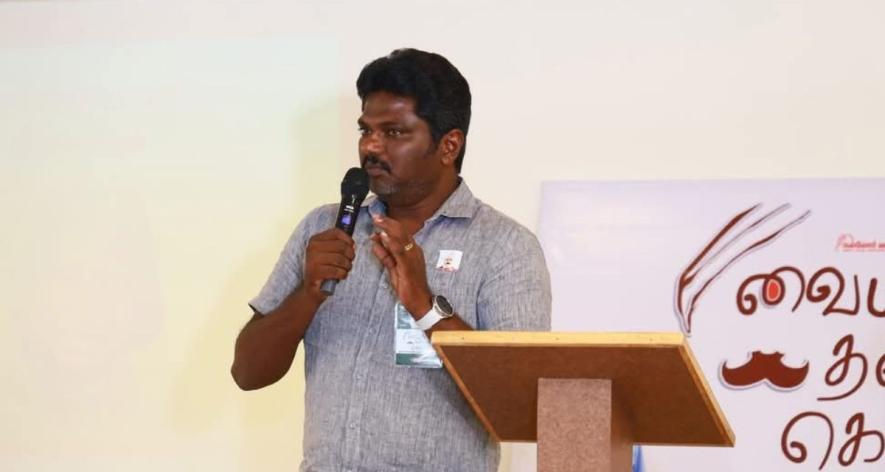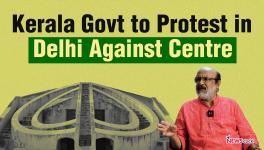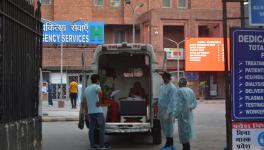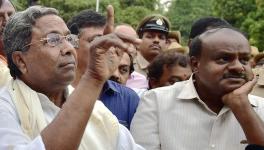Discontent, Misgovernance as TN Postpones Panchayat Elections

Arul Rajesh, former president of Muthugapatti panchayat (Photo sourced by Navya PK, 101Reporters).
Chennai, Tamil Nadu: Four and a half years ago, the Muthugapatti gram panchayat in Namakkal district stopped private water tankers from illegally extracting its groundwater. Now, with no elected representatives to hold the fort, tankers are gradually resuming extraction, and residents are helpless, said former panchayat president Arul Rajesh.
Like Muthugapatti, thousands of gram panchayats in Tamil Nadu are now losing the gains they made thanks to the state government taking over the panchayats’ administration since January 5, when the term of the elected panchayats ended. With the state government postponing the elections in 28 districts, citizens at the grassroots have little say in their daily affairs now.
No elections in 9,624 gram panchayats
Tamil Nadu currently has panchayat representatives in only nine districts where the elections were held in 2021. In 28 other districts, a total of 91,975 posts are vacant across the three-tier panchayat system, according to the Institute of Grassroots Governance (IGG). This includes 9,624 gram panchayat president posts, 76,746 posts of gram panchayat ward members, 5,090 block councillor posts and 515 district councillor posts.
As of now, the state government has designated Block Development Officers (BDOs) as special officers to govern panchayats.
IGG and other civil society organisations like Thannatchi and Voice of People have built a coalition demanding quick elections so that panchayats can function effectively by organising gram sabhas, implementing schemes properly and empowering elected representatives from marginalised communities. The coalition held a campaign in panchayats across 26 districts between January 26 and March 8. They also organised a protest in Chennai on March 30, demanding quick elections, in which about 230 people from these panchayats, including farmer leaders, SHG members, and former panchayat representatives, participated. Yet, the government has not responded, according to the coalition.
While the Tamil Nadu government has delayed the elections in the name of delimitation, the coalition said this violates the Constitution and several court orders. Particularly, they point out a 2022 Supreme Court judgement on the delay in panchayat elections in Madhya Pradesh. The court ruled that such delay “borders on the breakdown of the rule of law”, and specified that delimitation cannot be a reason for delaying local body elections.
Yet, Tamil Nadu has continued its practice of postponing panchayat elections this time too. Even the previous 2019 election was held after a three-year delay.
Panchayat councils’ previous decisions overturned
In the absence of elected councils, several panchayats are seeing their previous decisions being overturned or becoming ineffective. The BDOs who are now in charge each handle 10-15 or more panchayats, which means they hardly interact with the residents of each panchayat or understand their concerns. Residents have no platform to air their grievances either.
Nandakumar Siva, Vice President of the NGO Thannatchi, said, “For example, T Kallupatti block in Madurai has more than 40 gram panchayats. The BDO is the only decision-making authority for all these panchayats, so there is a centralisation of power. Such centralisation also leads to a lag in development projects and even routine works.”
In Muthugapatti village, private tanker owners used to draw water from wells 100-140 feet deep, which caused water levels to plummet in household and panchayat wells that were only 40-45 feet deep, said Arul Rajesh. “They mostly took water from their private land in the panchayat, but supplied it to industries 40-60 km away. As per rules, the panchayat can’t permit a commercial well within 100 m of a panchayat well. I stopped them from drawing water based on this.” He said he has complained to the BDO after the tanker owners gradually resumed water extraction recently, but there has been no action.
During his term, Rajesh also held a special gram sabha to build a new panchayat well since the water table in the existing wells had gone down. “Because of the conflict between the panchayat and the tanker mafia, contractors were unwilling to do this work, fearing obstruction at some point. So I crowdsourced funds from residents and returned it to them later when we got money for the project under the MGNREGS in phases,” he said.
But Rajesh complained that the operators who supply drinking water from the new well to households are not doing so diligently now in the absence of ward members. “Earlier, every house used to get water once in seven days as ward members monitored the system and spoke to operators regularly. Now it’s once in 15 days.”
In another gram panchayat, Vavipalayam in Thiruppur district, the BDO overturned a decision by the previous panchayat council to deny NOC for a factory. Former panchayat president K Kalamani said, “I rejected the company’s application in 2023 as people had objected to it due to the possibility of water pollution.” After the BDO’s approval recently, the residents held several protests, forcing the project to be put on hold, she added.
The most vulnerable groups are rendered powerless
For women and people from Scheduled Castes who are largely excluded from political power, the thousands of reserved seats in panchayats present an opportunity to make themselves heard. Rajesh and Kalamani, both from SC communities, are keen to contest again but are unable to.
“I hail from a habitation that the police historically designated as a black spot village (areas said to have high levels of illicit activities, caste violence). In case of any crime, the police first interrogate people in these villages. But as panchayat president, I proved that I am not a black spot village person and am perfectly suitable for this society,” Rajesh said. “During my term, the government’s State Institute of Rural Development (SIRD) also selected Muthugapatti as one of the 10 Panchayat Learning Centres (PLCs) in the state.” PLCs are supposed to be models for other panchayats due to their best practices and initiatives.
Panchayats may lose central grants, Gram sabhas, MGNREGS schemes derailed
NGOs also say that, in the absence of elected councils, Tamil Nadu panchayats are likely to lose grants from the Central Finance Commission (CFC) that make up a significant part of their annual budgets. According to operational guidelines for awarding CFC grants to panchayats, released by the Finance Ministry in 2021, gram panchayats will be eligible for the grants only if they have elected councils. Nandakumar cited the example of panchayats in Gujarat that didn’t receive CFC grants last year for this reason.
Since January, BDOs should have held two gram sabhas, but NGOs say the minutes and resolutions of these meetings are not being recorded properly.
M Gurusaravanan, Chairperson of IGG, which has studied gram sabhas in Tamil Nadu, said, “Generally only 200-300 out of the 12,000-odd panchayats in Tamil Nadu hold gram sabhas in the spirit intended and according to the rules. In the remaining panchayats, elected representatives used to write their own resolutions. Now BDOs are doing the same.”
BDOs are also preparing this year’s gram panchayat budgets, which could impact how schemes get utilised, he added. “For example, the panchayat budget has a component called labour budget for which the panchayat has to bring MGNREGS workers together and prepare the list of works for the year.”
Generally, only a few panchayats prepare labour budgets as per this process. But this year, BDOs have reduced the number of large-scale works and have prepared schemes that involve minimal workers, says Panchayati Raj activist Dinesh Kumar. He also points out that since February, MGNREGS workers in blocks such as Thellar in Tiruvannamalai have been paid daily wages as low as Rs 30 without even an option to complain. This is because the union government has not released sufficient funds to cover all MGNREGS works in the state since December.
“In Thellar, MGNREGS work has stopped due to non-payment of wages. MGNREGS website shows that in February and March, workers in several other blocks were paid less than Rs 110 (which is only about a third of the actual wage of Rs 319),” said Kumar. “If panchayats had elected representatives, they would have petitioned the authorities, put pressure on them to start new projects this year, and communicated the reasons for the delay to workers.”
Gagandeep Singh Bedi, Additional Chief Secretary at the Rural Development & Panchayat Raj Department of Tamil Nadu, has not responded to our questions regarding the complaints about governance in panchayats or the government's plans regarding elections.
Several panchayats don’t want to be part of municipalities
Several gram panchayats are also resisting the government’s delimitation plan that would involve merging them with municipalities. The main reason is that these panchayats are dependent on farming and MGNREGS.
In Cuddalore district, Lalpuram gram panchayat has been protesting in recent months against the plan to make it part of the Chidambaram municipality. Zakir Hussain, former union councillor of Melbhuvanagiri block, which includes Lalpuram panchayat, said that nearly a fourth of the panchayat residents depend on MGNREGS for their livelihood. “Lalpuram also has 400 acres of agricultural land, which will gradually get converted for other purposes if it becomes part of the municipality.” He said the panchayat’s ongoing implementation of rural housing schemes and setting up facilities like drinking water would also be disrupted.
“Our demand is that delimitation should only be done 10-15 years later so that the panchayat is developed enough to become part of the municipality by then,” said Hussain, adding that the government has not responded to their protests.
Once part of municipalities, these panchayats will have no gram sabhas. And Area Sabhas, the urban counterpart of gram sabhas, still largely remain on paper in Tamil Nadu.
NGOs say the state government should have done the delimitation exercise while the panchayat councils were still in power, so that they could have raised their objections formally.
While the lack of panchayat councils has far-reaching consequences for citizens, the Tamil Nadu government continues to give little importance to timely panchayat elections. Meanwhile, panchayats in several other states, such as Rajasthan, Telangana, Jammu & Kashmir and Manipur, have been suffering poor governance and denial of central funds due to delayed elections.
Navya PK is a freelance journalist and a member of 101Reporters, a pan-India network of grassroots reporters.
Get the latest reports & analysis with people's perspective on Protests, movements & deep analytical videos, discussions of the current affairs in your Telegram app. Subscribe to NewsClick's Telegram channel & get Real-Time updates on stories, as they get published on our website.



















